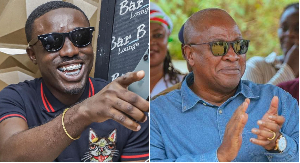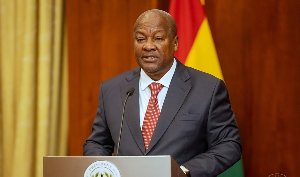HUGE ELECTION OPINION POLLS SPEAKS VOLUMES KUFUOR 49% *MILLS 24.3% * UNDECIDED 18.6%
According to THE STATESMAN, forty nine per cent of Ghanaians would vote for President Kufuor if the December Presidential election were held today, according to a comprehensive opinion poll.
The main challenger Prof. John Evans Atta Mills would receive less than half of his support, with just 24.3 percent of the vote.
A massive 18.6 per cent were ?undecided? as to which of the presidential candidates they would give their vote.
The independent nationwide poll conducted amongst 5,000 Ghanaians of voting age, suggests that satisfaction with the Kufuor administration is generally high, with 65.5 percent of respondents rating its general performance so far, as either good or very good.
On the specific question: how well do you think president Kufuor is doing his work? Well over two-thirds (69%) said ?very well?.
Almost four-fifths (76.7%) thought Ghanaians were freer to speak their minds today ?than four years ago?.
Almost three in four (73.7%) respondent thought ?Kufuor?s government was doing enough about checking crimes such as armed robbery?.
When the question was asked that who among a number of probable presidential contenders Ghanaians ?trusted to provide the most important need of their community?, the responses were as follows: Kufuor (54.2%), Mills (26.6%), Mahama (3.5%) and ?other? (13.2%)
The fifty-eight-item questionnaire was undertaken this year from March 19 to April 3.
The survey also stressed the importance of the floating vote, with current support for Kufuor almost enough to gain a first round majority.
Respondents were taken from all ten regions of the country from 28 constituencies and 42 electoral areas.
The regional distribution of questionnaires was based on the size of the electorate and at least one constituency was taken in each region in which Kufuor had lost in the previous elections or in which he had secured the lowest percentage of votes.
Randomly selected electoral areas and then polling stations within each constituency were chosen and respondent interviewed face-to-face in their homes.












